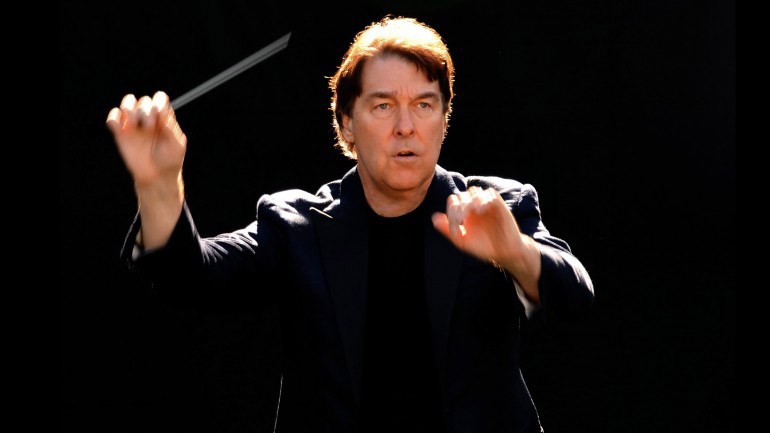BMI Composer David Newman Is Celebrated as the American Youth Symphony Reaches New Heights

David Newman is passionate about film music and even more so when he sees young musicians so receptive to it, as he has for the last ten years with the American Youth Symphony’s Hollywood Project. Newman, who is by all means an extraordinary composer, is also an expert conductor and a force to be reckoned with when it comes to live to picture performances. There are simply few conductors who can so consistently navigate an orchestra to add something new, even to iconic films, with each performance. The entire experience is breathtaking and Newman has passed his unique knowledge and enthusiasm onto the burgeoning members of AYS. And for this, he is being celebrated by the orchestra on November 19. BMI caught up with Newman before the gala, which is a night that will illuminate his mentorship as AYS performs BMI composer John Williams’ E.T., conducted by Carlos Izcaray, at UCLA’s Royce Hall. It will be a proud moment for all of us.
Tell us a bit about the mission of the American Youth Symphony. Why does it play such a vital role in film music?
The mission of AYS is fundamentally to train the top emerging orchestral musicians for professional careers in music. We believe, here in LA, that a knowledge of film music is vital to that training.
How did you get involved?
I am an alum of the orchestra and my wife, Krys, and I got involved in 2007, when our daughter Diana was in the orchestra. We took on a bit of a leadership role, especially Krys.
What does being honored at the November 19 gala mean to you?
I am happy to have worked with the orchestra these past 10 years and am always very excited about the film music component of each season. I believe that performing film music has helped with their training, even in the canonic pieces they play. There is quite a bit of crossover and reference in the projects we have chosen. We’ve had the luxury of being able to take this very seriously and make a study of some of our best composers.
This is the 10th anniversary of the AYS Hollywood Project. Tell us a bit about where you hope it will be 10 years from now and why.
I hope that AYS can explore more in depth, different important film composers, and relate it to their primary mission, maybe even do an original film that someone in the orchestra could compose music for.
What are the qualifications for joining AYS and how are the programs selected?
I believe at this point it is open to anyone. It’s completely merit based. We have a wide range of ages and they come from all over the Southern California area. They perform at the highest level of artistry.
How did the live to picture format evolve?
That’s hard to answer. In the 20’s, before there were talking pictures, the music could only be live. This phonemenon of doing an entire movie where the film score is played live, is relatively recent. As the technology and infastructure have gotten more sophisticated, it’s easier for orchestras to perform. I started conducting this type of film concert in the late 1980’s in conjunction with film music preservation. The technology was very difficult to use in performance. Now you can pretty much do anything.
What’s the hardest part of conducting this type of performance?
I believe the style of playing film music is a challenge to communicate to an orchestra that has never done it. They have to be like “actors” in a film. Everything needs to be emphasized. Loud is VERY LOUD and soft very soft. They also need to know what is going on, especially at certain points in the film as well as the overall story. It’s a very aggressive, emotional style - at least that’s how I view it. In my opinion, the sync is just as important as the music, so it`s a challenge to “make music” within the parameters of addressing the demands of the film. The audience deserves to have the maximum experience, as it was intended, and that also means there is room for interpretation within those parameters, just as one might approach a Puccini opera.
Tell us a bit about the upcoming program featuring John Williams’ score for E.T.
E.T. is a wonderful film to do live. I believe it’s the closest to a concert piece as any film score could be. It’s a perfect marriage of images, story and music. The last 1/3 (or ACT III) of the film is particularly symphonic. Also, for AYS to play it is just perfect. It’s a story about children - so everything is from that point of view. It’s young, fresh, emotional and has great pathos. There are several beautiful motives that recur that are always from the child’s perspective. Their view of the adult “menace,” the gorgeous harp lullaby that binds Eliot and E.T., and the glorious cathartic ending that portends Eliot’s journey into adulthood and the responsibilities and losses that growing up comes with. There is a lot of subtext in the score and I am sure that our orchestra will play it brilliantly.
Find out how you can attend this momentous event here.






Community
Connect with BMI & Professional Songwriters